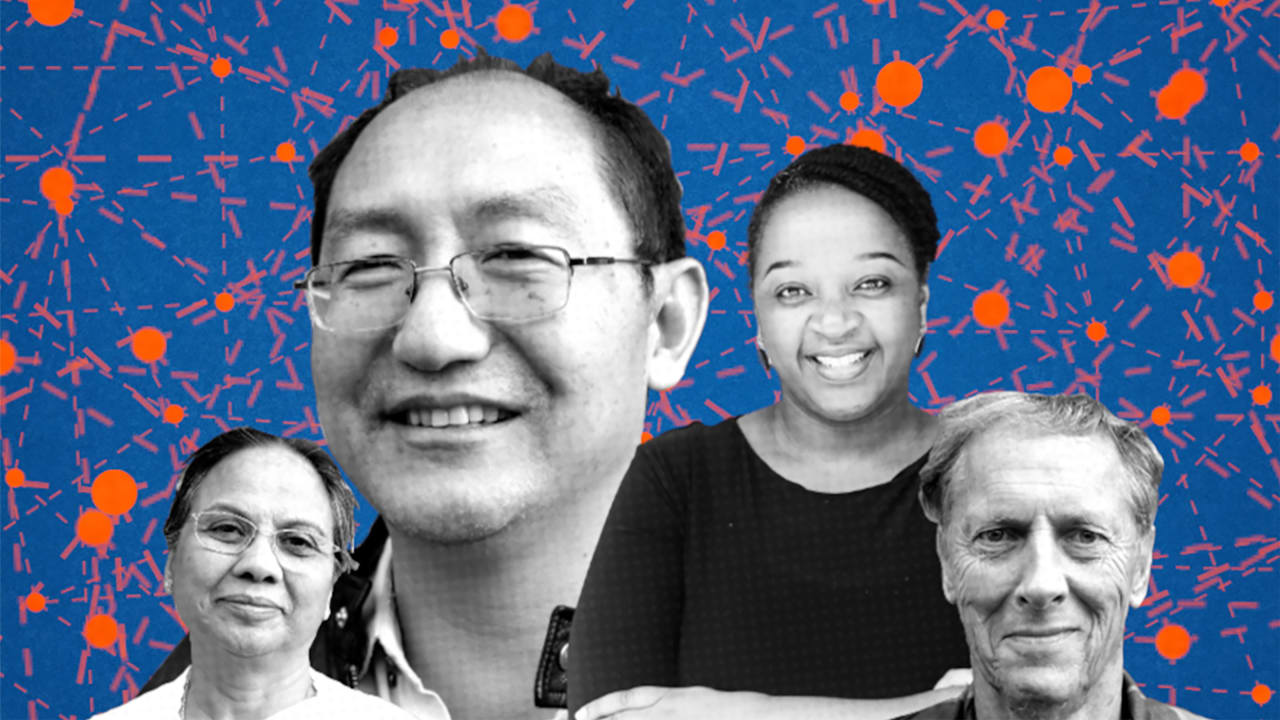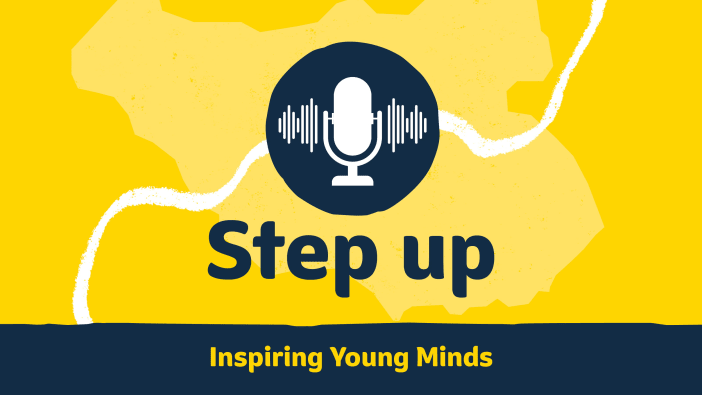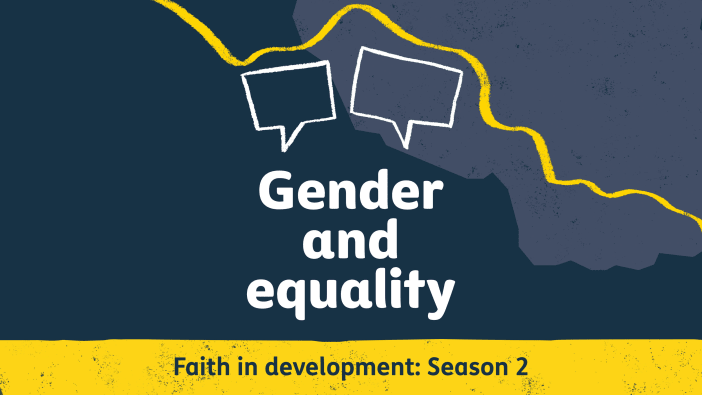Jake Lloyd 1:10
I'm Jake Lloyd. You're listening to the How to build community show. And in this episode, we're listening in on a conversation of community leaders from around the world. All members of Arukah network in which they discuss how to make the global health system fit for the future. And the answer, they argue, is to put community at its center. Now, this podcast is a co-production of Tearfund's Footsteps magazine and Arukah network. And Arukah is a global support network for people involved in community development. The word Arukah, it means wholeness, restoration and health. And this tells you what the network's members are aiming for. So, sometimes these members hold meetings online, which anyone can join to discuss a topic of the network's choosing. Together, they share stories, questions, experiences, ideas, challenge others, all with the intent of learning together and building each other up to go and serve their own communities. And in this episode, we're listening in on one of these conversations, which was about the future of global health. So the numbers for you that were 40 people at the meeting. There were nine countries represented. And I'm going to share with you ten short clips from this conversation. So you'll hear them discuss the potential within each community, the challenges of getting community voices heard. You'll hear why it's important for community groups to collaborate with one another. You'll hear them talk about how to build relationships with local governments. And you'll hear some stories of making mistakes and learning from them. So let's begin, first of all, Ted from the UK, who hosted this particular meeting, started by describing the challenges that the world faces at the moment, and did so by introducing a word that I had not heard before.
Ted Lankester 3:20
VUCA, some of you would have come across this term V-U-C-A. V for volatile, U or unpredictable, C for complex, A for ambiguous. And that seems to describe the way that our world is going. One way we're seeing this, for example, is higher energy prices, higher prices for food and other commodities, more frequent floods and droughts and wars, COVID and not knowing what the future holds. So communities are being put under a lot of pressure. Far more people, families, neighbourhoods, and communities are becoming seriously poor. And I guess that's the context that we have as we discuss this and look at what we might be able to do about it.
Jake Lloyd 4:18
That sounds like quite a challenge, doesn't it? But he then shared a quote he'd heard to illustrate why the solutions to such challenges can be found in every community.
Ted Lankester 4:30
If you take any community of, say, 200 people, regardless of how poor, remote or under-resourced they seem to be, given different circumstances, if they were well-resourced, that community is likely to include a potential country leader, a premier football player, and a world-class actor. In other words, there is a fund, there is a gold mine of ability within each of us and within each community if only it can be brought out and used for everybody's benefit.
Jake Lloyd 5:08
So a community is a source of strength with many different abilities. And they're able to find their own solutions to the challenges they face. And this strength, Ted argued, should be the foundation of efforts to improve global health. In a moment, you'll hear another Arukah member, Tom, ask a question. But first, Ted talked about an often overlooked relationship that community groups ought to focus on.
Ted Lankester 5:34
We sometimes do not engage with the government to the extent that we really should. It's extremely important because health departments from the top down in the government tend to follow good evidence-based advice from the United Nations, such as the World Health Organisation, and they have the policies and the guidance, sometimes, not always, the supplies which help to resource communities. So it's very crucial that we do not work separately from the government. We need to work in association as far as we possibly can.
Jake Lloyd 6:11
Let me push back on that slightly, Ted. In this world where health systems and governments are really stretched or in some cases quite weak, and then when local community organisations are failing, stretched themselves, maybe don't have the resources to engage with the government or are feeling under-resourced, it can feel quite daunting, can't it, to know how to make those relationships work. And your recommendations on the first steps that people can take to make that happen?
Ted Lankester 6:40
Well, yes, I would suggest that you know, within a community or within a trust that somebody who has got the confidence and perhaps the connections, who will actually ask to see the district medical officer or a member of the team introduce themselves, explain what they're doing. Ask in what ways they can work alongside the government, not in competition, but in collaboration. Build that relationship. And sometimes programs can get together, register with the government, and the government can then can actually contract out some of the work which they're unable to do to the work at the clusters. And that's how that works. Amazingly, in one of our clusters in Uttarakhand, North India.
Jake Lloyd 7:19
And this became a bit of a theme of this meeting, how communities and community groups can best build relationships with government representatives. And for community leader Dennyson from the Bihar region of northern India, this isn't easy.
Abraham Dennyson 7:37
We know very often the government strategy has been top down and where their policies and strategies are designed by the bureaucrats and increasingly the large NGOs also seem to be designing things from their, you know, office rooms. Of course, we know there are a lot of researchers going on and they pick up a lot of evidence from those researches. But then various said to start with the community that something is not in the planning. There's a lot of research for these evidences, but the strategies are from your office. How do you do that? And then how do you see that?
Jake Lloyd 8:21
Responding to Dennyson, one attendee, Graham from the UK, shared a possible solution to this that he's heard about through his work supporting the leaders of NGOs, charities and other groups that are trying to solve complex health challenges.
Graham Fawcett 8:38
Just been working with quite a number of large networks of organisations and the key message that came out of that was in a way, the need for a new kind of donor conference. So in other words, where the small NGOs in particular are too fragmented for government to listen, but if 60 or 70 or 100 or a thousand NGOs got together in a room, but they were the ones on the platform and the governments and the donors were listening, that could have a different kind of impact. And I'm finding, as I'm talking to people in various parts of the world, enormous appetite, but no idea how to organise that. And I think it's like fear that they may not either have the capacity or the ability to do it.
Jake Lloyd 9:25
We then heard from Munya in Zimbabwe, who might be a familiar voice to you if you're a regular listener to this show. She describes herself as a development worker and social scientist who helps communities advocate for change. She described how she trains communities to use something called a community scorecard. This is a simple form which households can use to gather information about the quality of local services like water, sanitation, schools, health clinics, roads and waste management. And this information can then be used to advocate for service improvements. Here's Munya.
Munya Mataruse 10:08
The community scorecard is basically a tool that communities use to harvest citizen perceptions or thoughts about a particular social service. So it could be the issue of health. It could be access to water, it could be access to roads. I guess in the context of our conversation here, it would be around health issues. So communities will develop specific questions that they put on the scorecard and then they administer in the communities. The questions are always guided by what we call the triple A Q framework. So we're asking questions around accessibility of a particular service. In our instance, how it would be helpful about accessibility of health services, about availability of the services, affordability of the service and the quality of the service. So the questions are always within the triple A Q framework. Once the community champions have developed the scorecards, they go into the communities they administer. The idea is to harvest as much information as possible from as many community members as possible so that they can develop a report that they use to engage. The community scorecard you put becomes their advocacy tool, which they then used to engage solution holders. In that instance, health is always provided for by government and local authorities are the ones that are responsible. At the point of engaging the state, the idea is always to make sure that communities come out of that engagement with commitments, shared commitments. First of all, a shared understanding with their solution holders about what exactly the problem is, but more importantly, what the commitment is from both the community members as well as the state in terms of what they're going to do to improve or to work towards improving that particular challenge. In this instance, it would be access to better health services. But what is more important is that the champions have to go back to the communities and feedback. We always make an emphasis that our intervention is not extractive. We don't just go into communities, get information and kind of just go away, but that champions of responsibility go back to communities and provide feedback in terms of the engagement they would have had with the state.
Jake Lloyd 12:34
And if you'd like to hear more from Munya, then do take a look at the past episode of How to build community called How to advocate for change. But what Munya said clearly resonated with Angela in Zambia. And as Angela spoke, she seemed to be almost imagining how this might take place in her own community.
Angela 12:54
I think for me, this is a great learning point that advocacy has been the missing component in our strategies because we'll hear when communities are having a document that they make themselves, not a researcher from outside, but some research that they have personally done. And at the end of the day, they are the ones to evaluate and see the good news like you have seen when they see these things. I think it's good civic education that communities learn how to hold their state or our leaders accountable.
Jake Lloyd 13:45
And then with a slightly different perspective, the group heard from Sedevi. Now, Sedevi runs a hospital and medical training center in Nagaland. That's in northeast India. His hospital has a community health department, but he explained how he has been guilty in the past of not listening to the communities that they seek to serve.
Sedevi Angami 14:10
We often go into the community looking for problems which we can solve with solutions that we have acquired from various very legitimate sources and our own experiences. And quite often many of these are based on our assumptions and often are legitimate, but they can be quite simplistic and naiive. So quite often it's that many sicknesses are due to poor hygiene and therefore the answer is to wash people with soap and water, provide basic sanitation, which sounds very good. Tuberculosis is caused by a germ and therefore treat them with six months of medicines, educate them about the disease and take care of the problem. And that's what the national program does. And this all sounds logical, but our experiences have been very different. And so I'd like to just give you a few examples of what we did wrong. We had sent a small team of nurses and the small team went to Myanmar to do a mission trip and they were armed with quite a lot of goodies. And they were also inspired by a very reputable Christian physician who has been working in community health for many, many years. And he said, when you go back to basics of hygiene, sanitation and things like that, don't talk about some very high-end things. So they took a lot of soap and all that they could, and they went there and they did their work in Myanmar and then they washed a lot of the babies there with soap and water. They took a lot of nice photographs. And what happened was actually the babies and the children who took a bath, their lives became miserable. Because prior to that, they never took about for many, many years. And their skin was caked with very thick dirt. And so it protected them from insects. So after they were washed, the insects started biting them and then their lives became miserable. So I thought, my goodness, we thought we were doing well.
Jake Lloyd 16:26
So what lessons did he learn from this? Here's Sedevi again.
Sedevi Angami 16:30
What was really wrong with our strategies is that we felt we knew the answers since we were educated from stories across the world, experiences. It's worked elsewhere and therefore it should work here. And we were really not listening enough. So we did not really create community leaders or community ownership amongst people who would find their own solutions based on their own experiences, observations and knowledge. So we did things for them and we did not really back on to their strengths well enough. So since then, my understanding and the manner of our working has changed a little bit and it is still changing. We try to evolve in to this. A few years back I noticed that this is for Graciela from the University of Cape Town, but there was a Dr. Steve Reid who came from the University of Cape Town and he introduced to us this concept of the Leading Causes of Life by Gary Gundersen. When you go into community, don't look at the problems or the other issues, but really look at what causes or generates life. So he called it 'The Leading Causes of Life.' So they were like connectivity, agency, coherence and generativity. And this I found really fascinating because I realised we were doing, you know, we were looking for problems. And if you look at problems, it's endless. The world is a wicked place. And ever since Adam and Eve in the garden, you know, things really worked out so bad.So chasing after problems is like the mental state where you go looking at the strengths of people, understanding that God, there is an image of God in these people. And the image of God has got fantastic potential. And if we can work with that, then there is there's a winner there.
Jake Lloyd 18:33
And finally, responding to Sedevi, Debbie Allison from an NGO in Southeast Asia pointed out the importance of patience and relationship building when it comes to finding the people in a community who are able to lead effective change.
Debbie Allison 18:50
Are experienced in lives, is very similar, but it does take time and you just have to spend time building those relationships and you see people who will rise to the top and they're the ones that will make the change in their community. And often they're not ones we always recognize right away, but over time and building their confidence and they're just giving them an opportunity. And then you see ones that will change their communities. And that's really exciting to watch. But it's not a quick process. It can't be done by one visit to a village or something, or one visit to a health center. It takes a long time and it's slow, but it's worth the effort.
Jake Lloyd 19:27
So that's almost it for this episode. I hope you enjoyed these extracts from the kinds of conversation that take place among members of Arukah network as they each go about trying to create this wholeness, health and well-being, otherwise known as Arukah in their communities around the world.
If you'd like to learn more about Arukah, just visit arukahnetwork.org . There you can find out ways to get involved, either as a member of the network or as a friend of Arukah where you can support their work. Before we go, you can help support this show by making a small monthly donation on our Patreon page. Just visit patreon.com/arukahnetwork. You can read and download every edition of Tearfund's Footsteps magazine at learn.tearfund.org , including editions on Communicable diseases and Community-led advocacy.
You can catch up on previous episodes of How to build community online or in your podcast player. Just search 'How to build community'. And finally, if you have some feedback on this show or maybe suggestions for future interviewees, then you can reach me via email [email protected] . But that's it for this episode. Until next time.
Bye for now.







